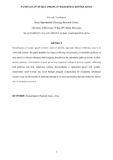Please use this identifier to cite or link to this item:
http://hdl.handle.net/10311/59Full metadata record
| DC Field | Value | Language |
|---|---|---|
| dc.contributor.author | Vanderpost, C. | |
| dc.date.accessioned | 2008-06-02T08:56:57Z | |
| dc.date.available | 2008-06-02T08:56:57Z | |
| dc.date.issued | 2006-01 | |
| dc.identifier.citation | Vanderpost, C. (2006) Pathways of Human Sprawl in Wilderness Buffer Zones, Population Environment Vol 27, No. 3 January, pp. 285-306 | en |
| dc.identifier.issn | 0199-0039 (print) | |
| dc.identifier.issn | 1573-7810 (Online) | |
| dc.identifier.uri | http://hdl.handle.net/10311/59 | |
| dc.description.abstract | Intensification of human sprawl in buffer zones of globally important African wilderness areas is of worldwide concern. The paper identifies two major conflicting (yet potentially reconcilable) pathways of rural sprawl in African wilderness buffer regions, described as the subsistence pathway and the wildlife-tourism pathway. Containment of rural sprawl near important ecological reserves requires addressing both pathways and their underlying conflicts. Reconciliation of subsistence sprawl with wildlife-conservation based tourism may occur through adequate compensation for community subsistence resource losses by the creation of sufficient alternatives to local communities that may reduce the need to rely on subsistence resources. | en |
| dc.language.iso | en | en |
| dc.publisher | Population Environment; Springer Netherlands; http://www.springerlink.com/content/0t141ml76q32717m/ | en |
| dc.subject | Human Sprawl | en |
| dc.subject | Protected areas | en |
| dc.title | Pathways of Human Sprawl in Wilderness Buffer Zones | en |
| dc.type | Preprint | en |
| Appears in Collections: | Research articles (ORI) | |
Files in This Item:
| File | Description | Size | Format | |
|---|---|---|---|---|
| cvanderpostpathwaysprefinalversion.pdf | 708.42 kB | Adobe PDF |  View/Open | |
| license.txt | 1.95 kB | Text | View/Open |
Items in DSpace are protected by copyright, with all rights reserved, unless otherwise indicated.
